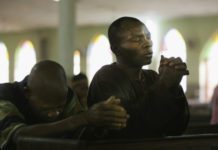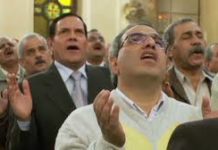By BosNewsLife Middle East Service with reporting by BosNewsLife’s Stefan J. Bos

CAIRO, EGYPT (BosNewsLife)– Egypt’s minority Christians were on edge Thursday, May 23, as voting continued in the first open presidential election since last year’s ouster of leader Hosni Mubarak, amid fresh fears that hardline Islamists hold the key to more power.
Many of Egypt’s 50 million eligible voters were seen queuing before polling stations, including in rural areas, because the contest is a novelty for the nation where election results during Mubarak’s 30-year rule seemed a foregone conclusion.
Yet, Christian leaders have expressed concerns that perceived hardline Islamic parties, who already dominate parliament, would now be able to put forward their presidential candidate.
“The Arabs [have been] hijacked by the Muslim Brotherhood [party] and the Salafists,” said Priest Rafic Greiche, chief press spokesman of the Greek Melkite Catholic Church in Cairo, the capital.
The hard-line Salafist Muslims of the Nour Party, who have become the second largest political force in the country, espouse a strict form of Islam similar to that practiced in Saudi Arabia, where security forces are known to have raided underground church groups.
That has contributed to an atmosphere of hatred on several occasions towards Christians, also known as Copts, who comprise some 10 percent of Egypt’s 80-million mainly Muslim population.
DOZENS KILLED
Dozens of Christians were killed and hundreds injured since last year, for instance in demonstrations against the destruction of churches.
On Monday, May 21, an Egyptian court sentenced 12 Christians to life imprisonment and acquitted eight Muslims over religious tensions in the country’s south.
The Christians were found guilty of sowing public strife, the possession of illegal weapons and shooting dead two Muslims in April of last year in Minya province, about 220 kilometers (135 miles) south of Cairo,trial observers said.
The religious tension in Minya spilled over into violence last year when a Muslim micro bus driver, angered by a speed bump outside a wealthy Christian man’s villa, got into a scuffle with security guards and later returned with residents of his village of Abu Qurqas.
Rights researcher Ishak Ibrahim told reporters the Christians nearby thought they were going to be attacked and shot from their rooftops down at the crowd, killing two and wounding two others.
MUSLIMS ACQUITTED
He said the fact that Muslims were acquitted “means that the attorney general’s investigation from the beginning was faulty and unfair because there was evidence to prove these men had burned Christian property.”
Additionally, Christians have been prosecuted for alleged blasphemy against Islam.
Among those detained is a 17-year-old Christian student who was sentenced last month to three years imprisonment after he posted cartoons on social website Facebook that allegedly “mocked Islam”.
Gamal Abdou Massoud was also charged with distributing some of his cartoons among school friends in a village in the southern city of Assiut, home to a large Christian population and the hometown of late Coptic Orthodox Pope Shenouda.
This year, Christian telecom mogul Naguib Sawiris, who founded the Free Egyptians political party, was charged with “blasphemy and insulting Islam” when he re-posted a cartoon of a bearded Mickey Mouse and a veiled Minnie Mouse on the online social networking service Twitter.
“DEFAMING ISLAM”
Imam was already given a three-month prison sentence by an Egyptian court for “defaming Islam” for a role he played in a 2007 film, according to trial observers.
Greiche suggested there was no evidence the situation of Christians would quickly improve after this week’s residential ballot, and he made clear that more rights may be curtailed.
In total, “we have four [presidential] candidates from this Islamic [background] who are not very tolerant especially towards the Christians, although election promises are always something else,” Greiche cautioned in an interview.
“Now we are on the edge. It’s all white or black,” he told Vatican Radio.
“If we have a President who is liberal and he will apply what he promised to give the Christians their rights of building the Churches, the rights of having their civic law, I mean the law for the family and not to have discrimination between Muslims and Christians, it will be good. If not it will be a very hard time.”








